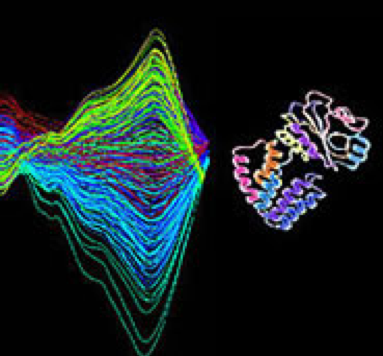Proteomics & Metabolomics Shared Resource
Augusta University
Contact: Lambert C. N. Ngoka, Ph.D., Director, Georgia Cancer Center Proteomics and Metabolomics Shar
Phone: 706-721-0306
Proteomics and Metabolomics, a part of systems biology, is fundamental for a full understanding of a biological system.
Mass spectrometry-based technologies have been indispensable to the development of molecular medicine. Clinical research can also benefit from proteomics and metabolomics by both the identification of new drug targets and the development of new diagnostic markers.
The GCC Proteomics and Metabolomics Shared Resource uses mass spectrometry as the key technology for qualitative and quantitative protein characterization and advanced methods for profiling and quantitation of small molecules. Our principal approach for protein analysis is 'bottom-up' proteomics, where all proteins are proteolytically digested, producing peptide surrogates (signature peptides) of the original proteins.
With highly specialized technology capabilities and proficiency and expertise of personnel in the field of mass spectrometry, the facility is well-prepared and positioned to serve as a regional, national, and international resource and to foster collaboration in the fast developing field of proteomics and metabolomics.
PROTEOMICS
- Protein extraction from cell lines, tissues and biofluids
- Co-immunoprecipitation
- Trypsin digestion
- Nano-LC/MS/MS
- Protein identification
- Detection and characterization of posttranslational modifications of proteins, structural characterization of modified proteins, lipids and DNA in disease, e.g., the identification and quantification of oxidative damage to proteins, lipids and DNA
- Screening for genetic mutations in proteins
METABOLOMICS
- Sample extraction and purification for metabolomics
- Metabolome profiling
- LC/MS analysis of the different sample sets (i.e., disease vs. matched controls)
- LC/MS differential analysis of the LC/MS analyses
- Provide LC/MS output (m/z and RT) highlighting the ions that differed the most in intensity between data sets
- Provide tentative identification based on accurate mass and molecules available in the METLIN database
- Provide firmer identification based on comparative MS/MS and high accuracy analysis of 'unknown' with a standard provided by the client
LCMS PLATFORMS
Thermo Fisher Scientific LTQ Orbitrap Velos Pro Hybrid FT MS
- Thermo Scientific- Dionex UltiMate 3000 RSLCnano
- Agilent 1200 Series Nanoflow LC System for MS
- Agilent 1200 Series capillary pump
Software:
1. Chromeleon 6.80 SR12 (full Version) (Thermo Fisher Scientific)
2. ChemStation for LC systems Rev. B.04.01 SP1 (Agilent Technologies)
3. Xcalibur™ 2.2 SP1 Build 48 (Thermo Fisher Scientific)
4. Proteome Discoverer 1.4-SP1 (Thermo Fisher Scientific)
5. BioWorks™ Rev.3.3.1 SP1 (Thermo Fisher Scientific)
6. Scaffold 3.65 & 4.0 (Proteome Software )
7. Scaffold PTM 2.1.0 (Proteome Software )
Agilent Technologies Q-TOF
- 6520 Accurate-Mass Quadrupole Time-of-Flight MS
- 1200 Series Binary LC System
MassHunter Workstation Software:
1. MassHunter Workstation Software, Qual. Anal. (Agilent Technologies)
2. MassHunter Workstation Software, Data Acq. for 6400 (Agilent Technologies)
3. MassHunter Workstation Software, Quant. Analysis (Agilent Technologies)
4. G3835-64000 Mass Profiler Professional B.02.01. Rev. B.02.01 G3835-6003 USK0183590 (Agilent Technologies)
Agilent Technologies QQQ
- 6410 Triple Quad LC/MS System
- 1200 Series Binary LC System
MassHunter Workstation Software:
1. LC/MS Data Acq. for 6200 Series TOF & 6500 Series Q-TOF (Agilent Technologies).
2. MassHunter Workstation Software, Qual. Analysis (Agilent Technologies)
3. MassHunter Workstation Software, Quant. Analysis (Agilent Technologies)
More about this core facility at Augusta University's website »
< Back to GRA Core Exchange facilities

